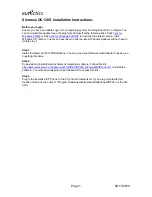
34 • Confi guration
[
S N O M
4 S N A T F
I L T E R
]
For http and https, you need to know the port numbers when you
want to log in. We recommend not using the standard ports. Operating a
server on the public internet usually leads to a lot of denial of service at-
tacks on the standard ports.
For sip, you must decide if you want to run the server on a stand-
ard port or a random port.
Standard Port
Random Port
•
User Agents that don’t
support DNS SRV can
automatically find the server
•
SIP-aware firewalls
automatically take care
about user agents behind
NAT
•
Buggy SIP-aware firewalls
don’t introduce new
problems by modifying SIP
packets
•
Less dangerous for DoS
attacks
•
Several SIP services can be
run on the same host
The decision depends on the situation. If you plan to use a good
SIP firewall, you should choose the standard port. Otherwise we would
tend to recommend a random port. Non NAT-aware user agents usually
must be configured manually anyway; in this case you can also provide a
port number.
The port for secure sip (sips) is usually 5061. The decision which
port to use is similar to the decision for the SIP port. We recommend using
a random port and publising the port number using DNS SRV.
4.
















































